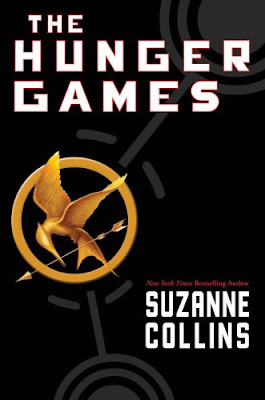"The Hunger Games" by Suzanne Collins
 Read: 12 Sept. 2009
Read: 12 Sept. 20095/5 stars
What can I say about The Hunger Games that hasn't already been said?
Not much, I think. But since I'm blogging to enter into the greater discourse that blogging allows me, here are my two cents...
The Hunger Games storyline might already be familiar to readers of Koushun Takami's Battle Royale. In The Hunger Games, as in Battle Royale, teenagers fight to the death in an arena. The lone person left alive is the victor. However, whereas in Battle Royale, the purpose for the brutal game is to discipline the lax youth, in The Hunger Games, it is to commemorate the defeat of 12 states against the autocratic Capitol. This commemoration takes the form of a sacrifice of 24 youths--one boy and one girl from each district. Except for the lone victor, of course.
If this, too, sounds a bit like the story of Theseus and the fourteen youths sacrificed each year to the Minotaur, that's because Ms. Collins does acknowledge that she takes inspiration from that particular Greek myth.
However, majority of her inspiration, as I believe is readily apparent in the book, is from Roman gladiatorial games. Reality and brutality as entertainment. Entertainment as a means of keeping the masses in check. The concept of panem et circenses. Literally, bread and circus. Food and entertainment. Stave off hunger by watching the games.
A little more about this story, though: Katniss Everdeen is a fifteen-year-old girl from District 12, the coal-mining district. She knows hunger and loss. Her father had died in a coal-mining accident years before, and she alone takes care of her mother and her younger sister, whom she adores. Everyone in District 12, except for the very special few, live in constant fear of hunger. Katniss keeps her family alive by learning how to hunt, and hunt she does with her best friend Gale.
However, the day comes for the annual reaping--the ceremony that randomly determines the boy and girl tribute to the Hunger Games from each district. To Katniss's horror, the girl tribute is her sister. This she cannot allow, so she volunteers herself instead. The boy tribute, on the other hand, is someone familiar to Katniss, though one who she barely had any connection with, a Peeta Mellark.
Katniss and Peeta are whisked off to the Capitol to get ready for the Hunger Games, the whole duration of which is telecast live to the entire country. Reality TV, extreme-style. Hence, preparation means a team of stylists and a coach-cum-publicist. Fighting for one's life then becomes dependent not just on physical prowess, but on how well one panders to the crowd. In this kind of situation, therefore, reality and fiction intermingle.
And I believe this is what I found fantastic about Hunger Games. The fact that it muddles the line between reality and the fantasy depicted in entertainment. Interestingly, this line is muddled not just in the case of the characters and their conflicts, but also in terms of the reader's reaction. For Ms. Collins has made voyeurs of us all. We have all become citizens of the Capitol.
What distinguishes the people of the Capitol from majority of the citizens from the districts is that Capitol citizens live in comfort. Hence, the Games are entertainment for them, nothing more. And the contestants pander primarily to them. They are characterized as superficial, spoiled, carelessly extravagant. Put that side by side with the teenagers who are fighting for their lives and for their districts that are languishing in poverty, and you are meant to despise the Capitol people. Despise their enjoyment in the tributes's wholesale death.
Yet here I am, enjoying the book and the entertainment that it provided.
It is one thing to get involved in the story. Quite another to be drawn in as a participant, in ways that you never expected or saw coming. So, my reality is that I enjoy this fictional account of kids fighting for their lives in an arena which is meant to simulate reality, though it is really contrived fiction. In Katniss' arena, then, one cannot even be truthful even if one wanted to. In my arena, the lie--the fiction--shows me a truth. Though I acknowledge that people from the Capitol are despicable, in the end, my enjoyment actually lumps me with them.
And if you're willing to take another level of this drivel I'm dishing out, consider also the fact that this fictional world created by Collins is based on the reality of the ancient gladiatorial games. Fiction from reality and reality from fiction. This, I believe, is the genius of Hunger Games.
So, more than the fact that I can definitely qualify the book as "un-put-down-able," more than my excitement at the developing romance angle, more than the concern about who would really win the games and how, I am truly impressed with The Hunger Games' themes and how the reader is made to experience these first hand.
For this experience then, my undying gratitude goes to the people of Scholastic, specifically Ms. Roselle and Ms. Joyce, who gave me my free copy of this book during a meeting with book bloggers last month. Thank you big.
I wonder if someone has already said something as confusing as I have about The Hunger Games. Let me end with something much clearer, then...
It's fascinating. Read it.



Comments
@Peter - Interestingly, I lose interest when something becomes cliche already. But I haven't lost interest in Hunger Games yet! Oh, and I've read Catching Fire already. Just haven't reviewed it yet. Now i have another kind of TBR pile--To Be Reviewed. Darn.
@artseblis - Thank you. You must like drivel, too.:)
http://themockingjay.vndv.com/forums
I just picked The Hunger Games up from the library yesterday - I can't wait to read it!